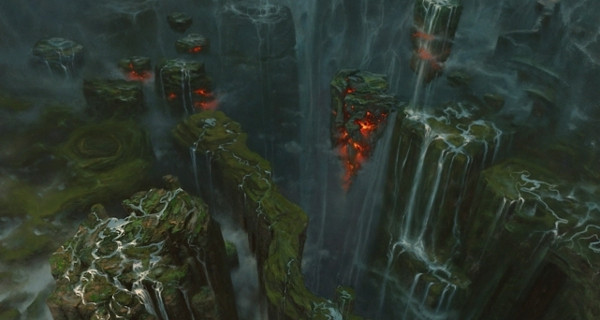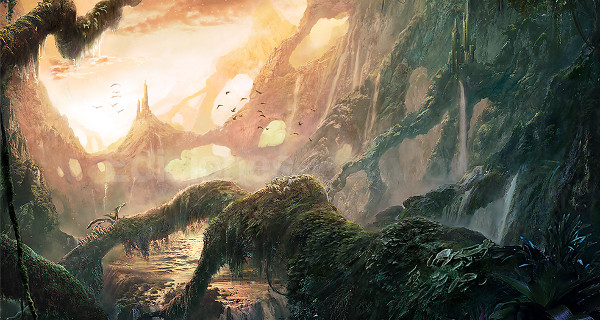Previously on this absurd blog, my rant about me not liking D&D 5e anymore focused on how I would hybridize 4e with it, to get the feeling I was looking for.
This is a fairly recent idea of mine, born mainly out of nostalgia, which sparked in me when I recovered old 4e-era material I thought lost.
What I did already with my main online group, with whom I play extremely rarely, so we want to have fun and advance meaningfully when we do, is blending D&D and Legend Of The Five Rings, the feudal Japan fantasy RPG, which has recently seen a new divisive edition. Something of the caliber of D&D 4e when it first arrived, with the difference that it was play-tested publicly, and from what I see it provides a really solid system and experience, which I remember wasn't exactly the case with 4e, which kind of came into shape after a year or two of books, errata, and constant expansion through official game-expanding magazines.
What I love of this latest edition of L5R (Legend Of The Five Rings) is that their namesake five rings (scores) which describe the characters (the four traditional elements plus "Void") don't really cover different things each like before, where some things were determined by your Fire ring, some by the Water one etc. While it's still true for some basics, which anyway usually take two rings and blend them (such as Endurance being derived by Water+Earth or "Focus" by Air+Fire), what these descriptors of the characters really provide is different approaches to every single skill/action. That is, you have five different ways of approaching everything, and you can usually be very good at one or two approaches, lacking in one or two more, and mediocre at the rest, depending on how you distribute your points, which in L5R depend in large part from your clan, family, school and background.
The connection of these elements with the story of the character can be very cool in the context of L5R, which is by design culture-heavy, but what really interested me is the mechanic of the game.
The five different approaches, with one or two kind of reliably good, make for a great addition to any RPG, in my opinion, because they kind of lower the chances of failure in performing some task, if you do it with your "good approach" (which of course it's not always possible or easy), and because they are a wellspring of role-playing opportunities.
They are particularly cool for a group like mine because when you play by post/chat very seldom, you don't want your bad luck with dice to plainly ruin the day of the character: it's just not realistic. Instead, you will succeed at the tasks you are good at, with the approaches you are good at, but it will be extremely difficult for you to perform other approaches, which sometimes are needed. This means the resulting story won't see a warrior failing to do anything because for some reason he was fumbling all the time with his swings at the monster, but an aggressive warrior perhaps failing to read the terrain and ending up in a bad situation, because he was trying to charge headstrong in a situation where flexibility and movement would have been the best approach. It doesn't compare.
In addition, the amount left to luck in this system, if you use the special L5R dice, is less in every way, even when you aren't using your best approach. The dice use special symbols which offer "success" quite often, but often at a cost: performing at your best is costly, like in real life. You accumulate "strife", which in the Japanese-themed game is especially connected to the characters having to restrict their emotions, but in a more generic take can just represent a mix of mental and physical strain. If you accumulate enough of these stress points, represented by flames on the dice, you become first of all unable to choose symbols on the dice that have them (usually they accompany success or opportunity results, more on that later), making you inefficient at everything you do, and then they kind of force you to have an "outburst", basically acting against your interest and, more practically speaking, losing time.
So compared to D&D, you have much more control: as a fighter, in D&D there is no such thing as "saving your strength to keep strong till the end of the fight", which instead here you can do by hitting less strongly, or less often, thus avoiding a build up of strife/strain. You also can score a "critical" much more often, and in an "explosive" way, meaning that a critical could lead to another critical, which could lead to another critical, since it's a dice pool system. This means that luck can indeed make you go "nova", as we say in the gaming slang, scoring a great success perhaps early on in an encounter or challenge, but that will mean most probably the next round or the one after that you will be severely worse, due to the accumulated strife/strain.
As I mentioned, success is not the only result you can get through L5R dice: you can also get Opportunity, represented by a flowery symbol, which can allow for all sorts of things leading to situations where perhaps even if you fail at what you set out to do, you end up with a favorable situation for the long run, or you even discover a completely different way to do what you want.
A possible use of Opportunity is even "formalized cooperative story-telling", so that depending on the element/ring you rolled Opportunity in, you can add details or even entire objects or people to the scene/story, of one type or another, depending also on the type of action you were performing.
This is getting very wordy very quick, so first of all here are the fabled L5R dice:
And here what you will think is an extremely complex thing, but it's really not: a character sheet of one of my characters fusing D&D and L5R, attaching the five different approaches to the ability scores themselves, magic, skills, and everything.
 |
| Click for full view, and sorry: it's mostly in Italian! |
After a lot of trial and error, I went for a system where the ring/element value would basically raise or lower the ability score for the given approach, using an equivalence of points and a simple average between the two. Then I left the possibility of using these averages to determine the number of L5R dice rolled, or the bonus on the single d20 of the classic D&D system. (respectively the bold numbers in the colored matrix and the smaller number in parentheses). The latter was usually inferior in success rate, as I mentioned, but it also avoided the outburst possibility, so in the end it ended up fairly balanced, with characters sometimes opting for the d20. The rule however was: once you start accumulating strife, you have to continue with the L5R system. Otherwise one could just use the d20 when close to the strife limit, allowing to have the best of both systems.
An interesting thing with this system is skills: they have to be more generic compared to the D&D ones, because sometimes what a D&D skill does is fully covered by one approach. So for example no more Stealth: it's something you can do with the Air approach of Dexterity, and if you want to get skilled specifically in it, you first need a generic Agility skill, and then acquire Expertise in the Air approach. Yes, this is another change: Expertise would have been too powerful with new and more generic skills. So to keep it as it is, influencing two different skills at a time, I restricted it to two approaches per skill, leaving the others out. This means one can't be an "Athletics Expert" anymore (Athletics having stayed since it's pretty generic): you will be expert at Fire Athletics (power/sprint) and Water Athletics (flexibility/fluidity) or perhaps Air Athletics (precision/reflexes) and Earth Athletics (endurance/balance). Not everything, which is unrealistic.
I don't want to explain all the ideas and adaptations that went into this, but I would like to use this experience as an inspiration for creating a new system that integrates better with D&D.
For example, five approaches might be too much for typical D&D, especially with the fifth one being this very Japanese "Void" one, that being so connected with self-sacrifice and magic, could end up being "the magic approach", making the whole system skewed. Why would a magic user be especially good at self-sacrifice, for example? Doesn't make sense. The manual of L5R offers examples in which this approach could be used for mundane tasks, but some work in typical D&D settings, most don't. When would you roll Void Athletics, for example? L5R explains "when you know you are risking your life", but that's too open to interpretations.
So most probably I would keep it at the four elements, or I would transform the fifth quite a bit.
In addition, this system offers a lot of ideas when it comes to skills. While I said before, for example, that I would like Classes giving out mostly combat benefits, while Background/Themes would focus on non-combat, with Approaches into the mix, things can be more fluid: a class could indeed give some skills, as well as a bonus to an approach. For example, if Wizards need Earth (which in intellectual skills is associated to memory), it would make sense for the class to boost that element.
Some classes seem indeed prone to use one approach more, while others are more generic. This would mean that some classes would leave a choice of which element/approach to boost, while others would probably be fixed, or partially fixed. A Rogue must boost Air for sure, and then whatever else, for example.
I also thought many times about these elements representing different kinds of magic, and even different spells. A Wizard would be more interesting I think, if by personal inclination some spells would come more naturally than others. Air for Illusion and Divination, Water for Enchantment and Transmutation, Fire for Evocation and Conjuration, Earth for Abjuration and Necromancy.
Sure, it would limit the choices of spells of many Wizards and Sorcerers, if the ring value influenced the efficacy of the spell, but these are the things that really define characters and make for great role-playing.
Enough for now: these ideas need a good Earth approach, which I surely can't be good at when sleepy!












/pic4271136.jpg)





0 comments:
Post a Comment